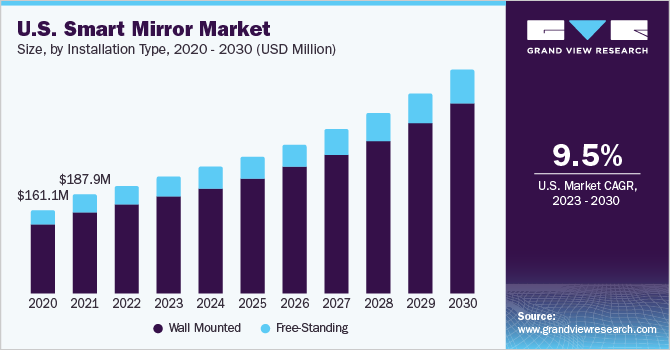The global smart mirror market was valued at USD 514.6 million in 2022 and is projected to expand at a compound annual growth rate (CAGR) of 8.8% from 2023 to 2030. The increasing adoption of smart mirrors in the retail sector is contributing to this growth, as they enhance the customer shopping experience. For example, in February 2022, MySize, a provider of AI-driven measurement solutions, introduced the FirstLook Smart Mirror for use in physical retail stores. This interactive mirror features a touch display that functions as a mirror and includes advanced features such as a 3D virtual try-on experience, personalized size and style recommendations, and a contactless third-party POS system—altogether elevating the consumer experience.
The rising popularity of smart home devices is another significant factor driving the market. Smart mirrors integrate effortlessly into smart home ecosystems, functioning as central control hubs that display information, send notifications, and connect with other devices. These mirrors are often compatible with voice assistants like Alexa and Google Assistant, as well as entertainment services such as Netflix. For instance, Evervue USA Inc. offers magic mirrors that support streaming platforms including Netflix and Hulu. The growing consumer demand for smart home products, coupled with increased interest from manufacturers and technology firms, is expected to further propel market growth over the forecast period.
Installation Type Insights
In 2022, wall-mounted smart mirrors accounted for over 80.0% of the market share. This preference is largely driven by safety and space-saving considerations. Free-standing mirrors carry a greater risk of tipping over, while wall-mounted versions provide more stability—especially important given the higher cost of smart mirrors compared to traditional ones. Additionally, wall-mounted options help save floor space and enhance room aesthetics, making them especially popular in smaller areas like bathrooms where space efficiency is crucial.
Application Insights
Commercial applications made up over 55.0% of the market share in 2022. Smart mirrors have gained popularity in commercial settings due to their ability to elevate customer engagement, provide interactive experiences, and generate valuable insights for businesses. In retail, these mirrors allow customers to virtually try on apparel, accessories, or makeup, improving convenience, reducing returns, and increasing sales.
Get a preview of the latest developments in the Global Smart Mirror Market! Download your FREE sample PDF today and explore key data and trends
Distribution Channel Insights
Offline channels accounted for over 70.0% of global smart mirror revenue in 2022. Physical retail stores offer advantages such as the ability to see, touch, and evaluate the product before purchase. This is particularly important for premium products like smart mirrors. Additionally, trained in-store staff can assist customers with demonstrations, answer questions, and provide personalized recommendations, offering a level of customer service that strengthens the appeal of offline purchasing and helps maintain its dominance in the market.
Regional Insights
North America held over 45.0% of the global market share in 2022. The integration of smart speakers like Alexa into mirrors has contributed to their growing popularity in the region. Startups like Lululemon and tech giants such as Google are investing in smart mirror technologies, increasing public awareness of AI-driven innovations. As technology continues to evolve, smart mirrors are expected to become even more advanced and widespread in everyday life.
Key Companies in the Smart Mirror Market Include:
-
ELECTRIC MIRROR, INC.
-
Séura
-
Hidden Television
-
Majestic Mirror & Frame
-
AVIS Electronics Company
-
FOSHAN ETERNA INTELLIGENT BATHROOM CO., LTD.
-
Reflectel
-
LumiDesign
-
Evervue USA Inc.
-
Videotree
Gather more insights about the market drivers, restrains and growth of the Smart Mirror Market

